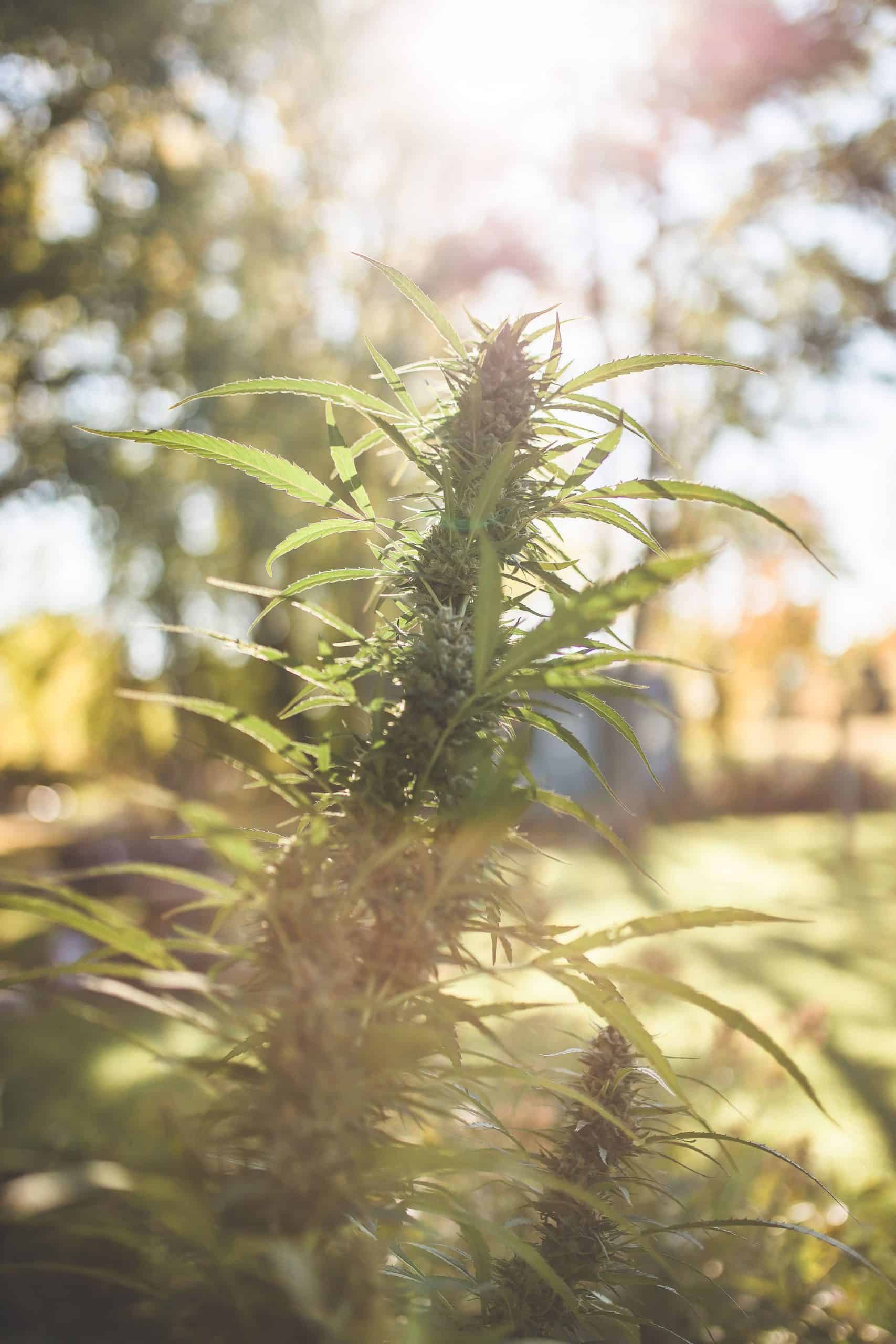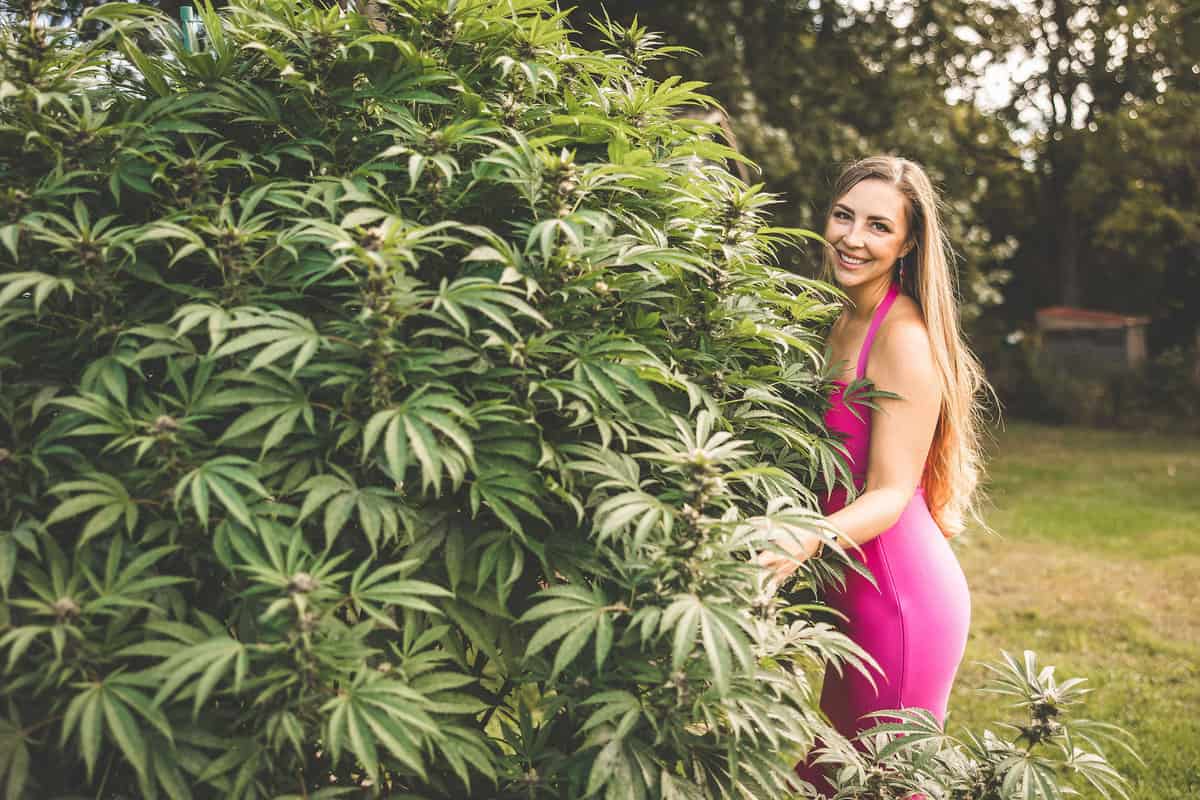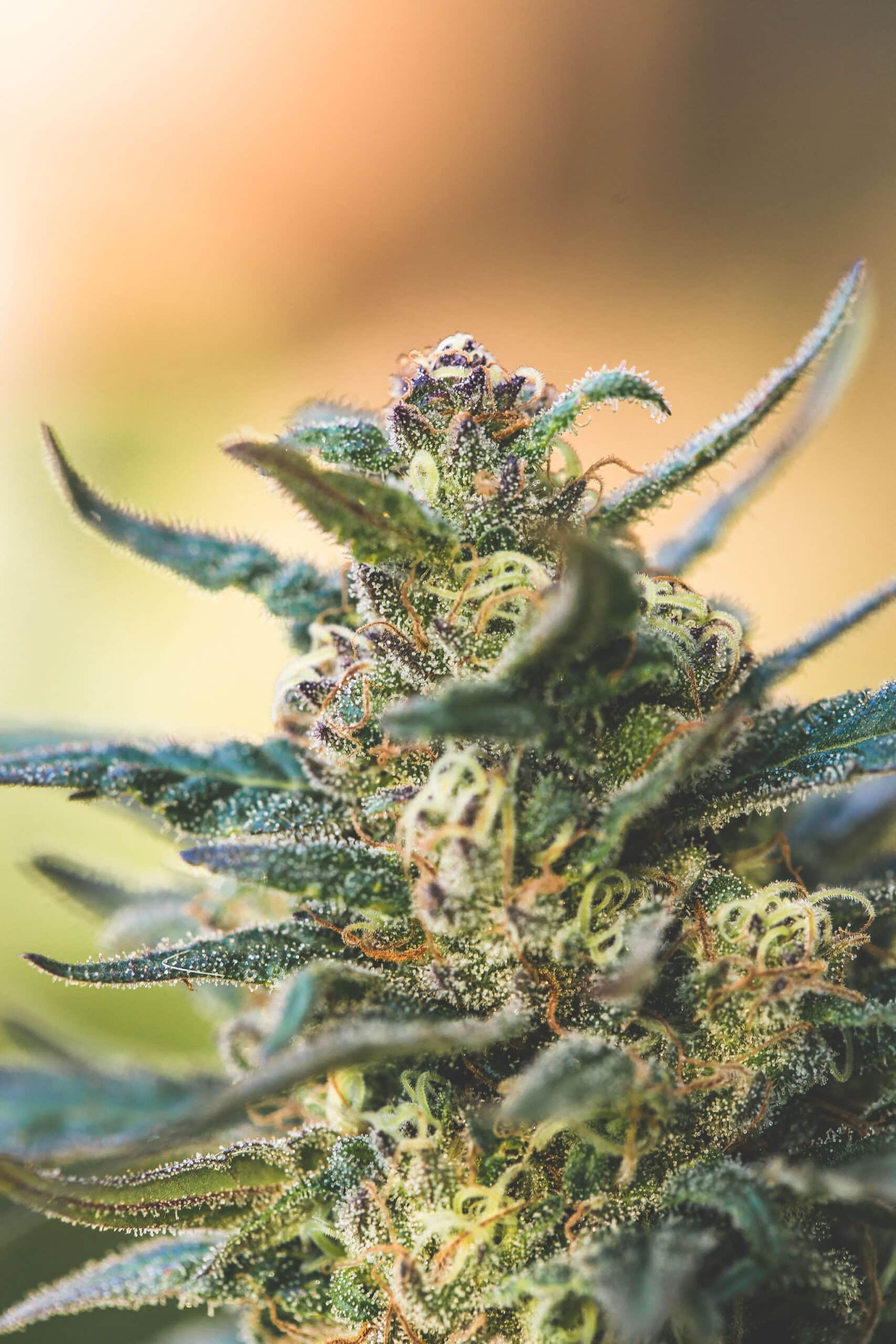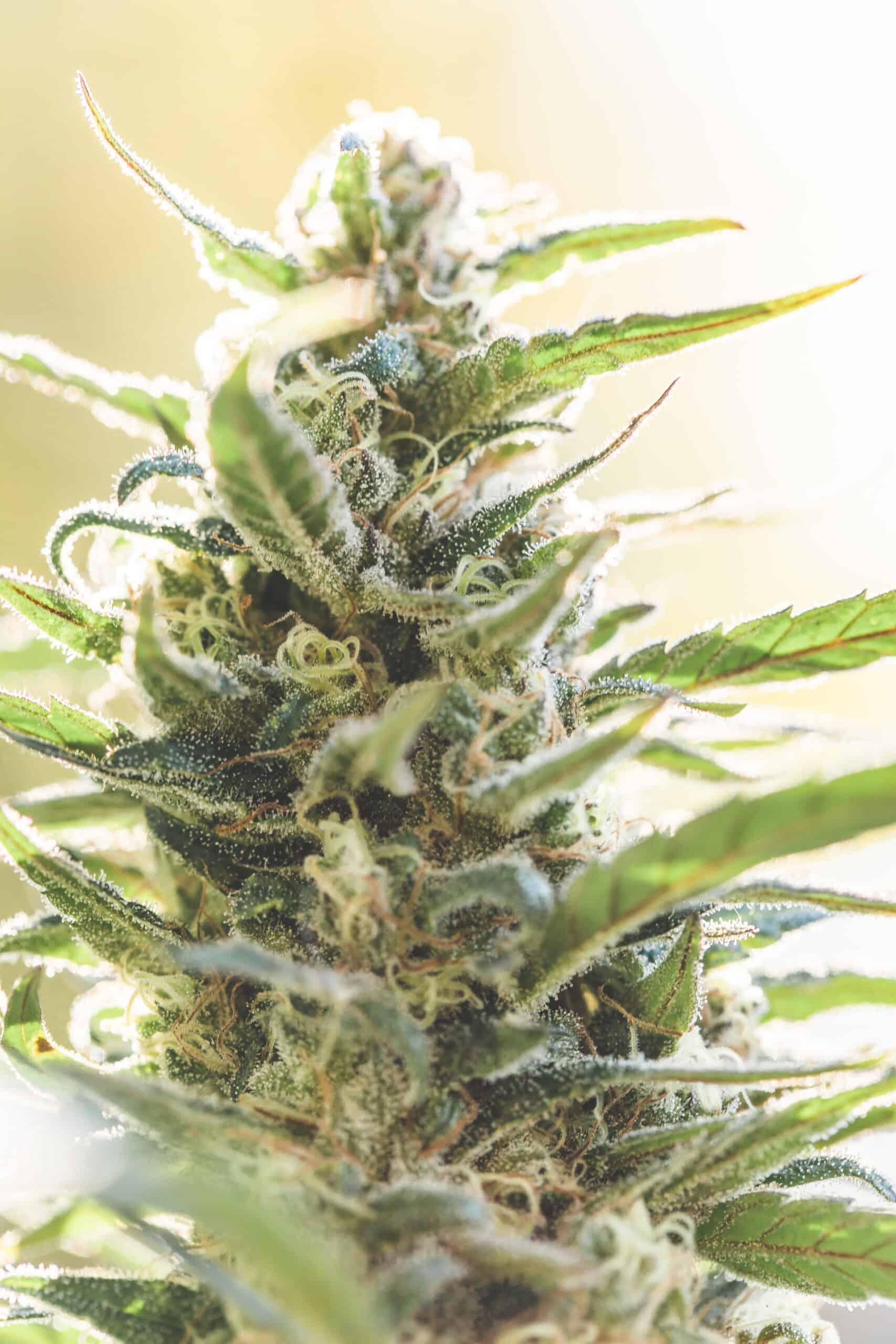Have you heard the rumors? Is it true? Can cannabis help with weight loss? In this article, we will explore what this dietitian has to say, what real people say, and everything in between to help you discover what you really need to know if you want to use cannabis to help you lose weight.

Table of Contents
Article Features
- Healthy lifestyle tips to make cannabis work for you
- A list of strains high in the “skinny” cannabinoid THCV
- Want to try THCV for yourself? Shop with me and have my dietitian-created, tested, and approved THCV Curb Sugar-Free Gummies delivered directly to your door! Now shipping across the US.

Why You Will Love This Guide
The myth that marijuana users are lazy, unmotivated, apathetic stoners has continued to plague the minds of non-consumers for years.
But for many people, myself included, cannabis can be an extreme motivator to achieve many different things in life, including weight loss.
In fact, I have had so many members inside my Edibles with Emily Community who have proven this to be true, with one person losing over 100 pounds with cannabis and healthy eating alone.
So, can cannabis help with weight loss?
Well, it’s not a magic cure, but there is a lot of promise!
In this article, we will explore what the science says and what you need to know if you want to use cannabis to help you lose weight.
Looking Past The Stereotypes
Cannabis use has been surrounded by years of myths, misinformation, and assumptions about how the herb can affect your weight.
For example, the media and legal authorities have long put forth the myth that all cannabis users are lazy stoners.
If the tales are believed, the majority of cannabis users spend their time in the basement getting stoned.
And when they aren’t, they are raiding the refrigerator, munching on snacks, or making midnight burger runs.
Whether for medical or recreational use, historically, cannabis users have been stigmatized for being lazy, unmotivated, and physically unfit.
There is also plenty of anecdotal evidence and research showing that cannabis can stimulate the appetite and cause the munchies.
So if these rumors are true, why are there so many people who have continued to prove this theory wrong?
Why are there thousands of consumers who have proven that the use of cannabis actually has the opposite effect?
Why are there consumers who use cannabis and as a result experience a lower body weight, lower BMI, and better health overall?
Let’s explore what the science suggests!

Studies on Cannabis and Weight
Before diving in, it is important to note that there is not enough evidence or scientific research in the form of clinical trials to make a definitive statement about cannabis and the effect it has on weight.
However, that doesn’t mean that there is not some preliminary evidence to suggest that cannabis may play a very important role in weight control.
Like this 2019 study published in the International Journal of Epidemiology which found that, in general, people that use cannabis tend to weigh less than non-cannabis users.
While this may seem at odds with the idea that cannabis is an appetite stimulant, this study corroborated earlier research from 2014 published in Innovative Clinical Neuroscience
This study confirms that in large epidemiological studies conducted on the general population “findings consistently indicate that users of marijuana tend to have lower body mass indices than nonusers“.
One idea of why this happens comes from a 2018 study published in Cannabis and Cannabinoid Research.
This study suggests the down regulation of the CB1 receptor offers a “theoretical explanation for the significantly reduced body mass index and rates of obesity in users, in conjunction with increased caloric intake.“
Another explanation may be the role cannabis plays in affecting metabolic rates and subsequently metabolic disorders like diabetes mellitus.
In a first of its kind study published in 2020 in Translational Psychiatry, the authors suggest that cannabis consumption has a significant influence over the important hormones that affect appetite, including insulin, GLP-1 and, ghrelin.
The researchers tied this back to the role of the body’s endocannabinod system (ECS).
Their report noted that the influence of cannabis on insulin observed in this study “is in line with the established role of the endocannabinoid system in regulating glucose metabolism and, at large, energy balance.“
As claimed in the Journal of Diabetes, Obesity and Metabolism, mounting evidence indicates that an overactive ECS is involved in the development of diabetes and insulin resistance.
This is further supported by the International Journal of Obesity which points to the cannabinoid receptor CB1.
This study claims an “overactive endocannabinoid cannabinoid type 1 (CB1) receptor signaling promotes the development of obesity, insulin resistance and dyslipidemia“.
While many of these are animal studies, and we need more human studies, there is plenty of evidence to suggest that cannabis does, in fact, have a major influence over energy storage, appetite suppression, and obesity rates.

How Does it Really Work?
As with all things in the real world, there’s more to the story than just the simple consumption of the Cannabis Sativa plant and seeing massive weight loss.
There are many variables that can impact cannabis use and your overall experience including strains, cannabinoid levels, ratios, dosages, terpenes, and more.
On top of that individual responses to cannabis can vary widely.
Additional factors such as genetics, lifestyle, and overall health also play crucial roles in determining one’s weight.
Ultimately you will need to take all of the information presented below into consideration, and then apply that to your unique needs and experience.

Cannabinoids and Dose
Different strains of cannabis contain varying levels of cannabinoids, and these differences can significantly influence your experience.
Cannabinoids are the active compounds found in cannabis, the most well-known of which are THC and CBD.
Tetrahydrocannabinol (THC) is the psychoactive compound in cannabis that produces the feeling of being “high.”
Each strain has a unique ratio of these two cannabinoids, which can affect the endocannabinoid system differently.
Strains with a high THC to CBD ratio often lead to increased appetite and therefore potential weight gain.
Meanwhile, strains with a higher CBD to THC balance can have the opposite effect, potentially promoting weight loss.
Of course, the dose of each cannabinoid can have a significant influence as well.
High doses of THC can potentially make you feel unwell, where as high does of CBD are generally more well tolerated.
Understanding the cannabinoid content and ratio in different cannabis strains is a key factor in predicting their potential impact on your overall experience.
Keep in mind, individual reactions to these cannabinoids and the corresponding weight effects can vary greatly due to factors such as genetics and metabolism.
Application Methods
Apart from the cannabinoids and dosages, you can manipulate the way you consume cannabis to keep your appetite intact and not succumb to binge-eating behaviors.
The method of cannabis consumption you choose can significantly affect the experience and, by extension, influence your weight.
Inhalation, either through smoking or vaping, typically provides the quickest onset of effects due to the direct transfer of cannabinoids into the bloodstream from the lungs.
These methods are often associated with increased appetite, potentially leading to weight gain if not moderated.
Topical applications, such as creams and lotions, primarily provide localized relief and are less likely to impact weight.
Edibles, on the other hand, have a delayed onset as they must be digested and processed by the liver before entering the bloodstream.
They often result in a more potent and longer-lasting effect, which can include increased appetite.
Sublingual methods, where cannabis is placed under the tongue and absorbed directly into the bloodstream, offer a balanced onset and duration of effects, potentially providing a more manageable influence on appetite and weight.
As with all aspects of cannabis use, individual responses vary greatly, and personal lifestyle factors will continue to play a crucial role in any potential weight implications.
Cannabis Strains
The specific strain of cannabis consumed can potentially influence your weight in several ways.
Indica and Sativa, the two primary types of cannabis, exhibit different impacts on weight.
Indica strains are often associated with an increased appetite, a phenomenon colloquially referred to as the munchies, due to their higher THC content.
This could inadvertently lead to weight gain if one’s diet is not controlled.
On the other hand, Sativa strains, which usually contain a higher concentration of CBD, may potentially promote weight loss.
Sativas are also more likely to stimulate energy and activity levels, which could lead to increased caloric burn.
However, the specific effects will still largely depend on individual factors such as a person’s tolerance level, metabolism, and lifestyle choices.
Cannabis has thousands of strains that have multiple benefits, and you should prepare to experiment and choose the ones that help you manage your weight.
Look For THCV
As unlikely as it may seem, despite its reputation for stimulating the appetite and causing the munchies, research suggests that some specific cannabinoids may help with weight loss.
The cannabinoid tetrahydrocannabivarin, or THCV, has a molecular structure that is similar to THC, but produces very different effects.
THCV, unlike traditional Δ9-THC, is non-intoxicating and does not cause a high, but it does have a reputation for being an appetite suppressant.
THCV works with THC, causing the effects to come on faster. Many people suspect that THCV is the cannabinoid behind some of the potent “one hit” strains.
THCV not only causes the effects of cannabis to come on faster and more intensely but also causes them to taper off quickly.
Additionally, THCV may act as an appetite suppressant, offering a unique array of benefits that differentiate it from other cannabinoids like THC or CBD.
Research published in the Journal of Cannabis Research found that THCV works similar to many pharmaceutical diet drugs but with far fewer and less severe side effects.
Another study published in the Journal of Neuropsychoparmacology shows that THCV can alter connections in the brain and reduce addictive behaviors, including helping to control food intake.
Finding a strain that is high in THCV levels can be challenging because most strains only contain trace, undetectable amounts of the cannabinoid.
However, lab testing has found that THCV is most common in sativas and particularly abundant in landrace strains originating from Africa.
There are also several hybrid strains with African genetics that make them predisposed to higher THCV levels.
While genetics can be an indicator, the best way to ensure the strain you choose is high in THCV is to request the lab results from the budtender at your dispensary.
Popular TCHV Strains
- Durban Poison
- Girl Scout Cookies
- Pineapple Express
- Willie Nelson
- Blue Dream
- Doug’s Varin
- Pineapple Purps
- Power Plant
- Red Congolese
- Jack the Ripper
- Durban Cheese
- Skunk #1
- Sour Diesel
It’s Not a Magic Cure
Like any diet aid or supplement, the effectiveness of THCV to help control weight is primarily connected to personal habits.
THCV may help, but there is no replacement for a healthy lifestyle and good eating habits.
So, while THCV may be a helpful aid for weight loss and to control food intake, it’s not a magic cure, and healthy habits are still important.
Below, I will review some of the most important healthy lifestyle factors to consider, and how incorporating cannabis may produce significant changes.

Additional Healthy Lifestyle Factors
The use of cannabis and its associated benefits can impact other lifestyle factors that ultimately contribute to a healthy weight.
Next, we’ll explore how cannabis can help you achieve a healthier lifestyle by improving your eating habits, physical activity, stress and anxiety levels, and quality of sleep.
Healthy Eating
As you already know, maintaining a healthy diet is essential to manage weight, but sometimes, it can be challenging to make healthy choices and stick to them.
From experience, I can tell you that responsible cannabis consumption, paired with an overall focus on wellness, can inspire healthier eating habits.
When used mindfully, cannabis can our heighten senses, making the flavors and textures of healthy foods more enjoyable and thus encouraging a preference for nutritious options.
Moreover, becoming more in tune with your body through cannabis use can enhance the awareness your of hunger and satiety cues, potentially curbing overeating.
Making a commitment to feeling well may also foster an understanding of how diet impacts your overall health, leading you to make conscious food choices that align with your bigger wellness goals.
However, individual responses to cannabis are varied, and it is essential to balance cannabis use with other healthy lifestyle habits for optimal results.
Physical Movement
Exercise is a crucial component of both weight management and mental health.
As published in the Canadian Medical Association Journal, regular physical activity boosts metabolism, burns calories, builds muscle and helps manage anxiety and depression.
But for some people, exercising can be challenging or even painful.
Cannabis can help by reducing inflammation and chronic pain, allowing you to exercise without discomfort.
Moreover, some strains can also increase energy levels, motivation, and focus, making workouts more enjoyable, especially for those who struggle with mobility issues.
And don’t just take my word for it, preliminary evidence supports the idea that cannabis consumers exercise more.
According to data published in the American Journal of Health and Behavior, adults age 60 and older who use cannabis had a lower body mass index and were more likely to engage in exercise than non-users.
Reduced Stress and Anxiety
It is no secret that chronic stress and anxiety can impact your mental and physical health, leading to weight gain.
As published in Psychosomatic Medicine, stress has been linked to increased cortisol levels, which can cause fat accumulation in the abdominal area.
Cannabis, speficially the effects of THC and CBD, can help combat stress and anxiety by promoting relaxation, inducing calmness, and reducing cortisol levels.
Moreover, some strains can also enhance mood, making you feel happier and more content.

Better Sleep
Whether it be directly or indirectly, sleep plays a significant role in weight management.
A lack of sleep can lead to weight gain by disrupting hormones that regulate your appetite, hunger, and metabolism.
In fact, poor sleep may be the most critical factor that affects your overall health.
Cannabis may help improve the quality of your sleep by promoting relaxation and reducing anxiety and pain, which may interfere with sleep.
Plus, some strains that contain CBN can induce drowsiness, making it easier to fall asleep faster and stay asleep longer.
Alcohol Alternative
Cannabis use offers a potential alternative to alcohol use, which can carry significant benefits for weight management.
Alcoholic drinks are calorie-dense, with little to no nutritional value, and can also stimulate appetite, leading to an increased intake of food.
By substituting alcohol with cannabis, you may significantly reduce your caloric intake, aiding in weight maintenance or loss.
Furthermore, as previously mentioned, certain strains of cannabis may promote increased activity levels and enhanced sensory experiences, which can lead to more physical activity and healthier food choices.
Swapping cannabis for alcohol may have a surprisingly long list of benefits, with reduced weight being one of them.
In Conclusion
The bottom line is that cannabis is not a magic pill for weight loss, but it can impact multiple lifestyle factors that ultimately contribute to weight management.
By choosing the right strains and consumption methods, you can use cannabis as a tool to enhance your healthy eating habits, physical activity, and quality of sleep while reducing stress and anxiety levels.
However, it’s essential to consult with a healthcare professional before incorporating cannabis into your weight-loss plan, particularly if you have underlying health conditions or take medications.
Moreover, cannabis alone is not a miracle solution for weight loss, and it should be used in conjunction with a healthy diet and exercise.
Nevertheless, cannabis can be a helpful tool to support a healthier lifestyle.
If you’re looking for more support and ways to incorporate cannabis into your healthy lifestyle, be sure to check out my Nourish Your High Masterclass.
Nourish Your High Masterclass
Imagine a holistic approach where healthy living aligns with your unique needs, including empowering choices like mindful cannabis use. This masterclass is your opportunity to explore new possibilities, unlock fresh motivation, and create sustainable, feel-good habits that truly work for you.
More Articles You Will Love
Articles & How-To Guides
9 Ways Cannabis Enhances a Holistic Lifestyle
Articles & How-To Guides
Dietitian Approved Tips For Managing The Munchies
Articles & How-To Guides
40+ Delicious Healthy Cannabis Recipes
Articles & How-To Guides
How to Use Cannabis with Autoimmune Disorders
Articles & How-To Guides
How Cannabis Can Support a Keto & Low-Carb Lifestyle
Articles & How-To Guides


















Hi,
Loved the article! I am going to share with a friend that is currently going to school to be a trainer and help people with weight issues.
I would also like to be on the list to be notified when you get your THCV products on line.
Thank you
Bec
Hello Rebecca! Thank you for reading and sharing with a friend, I really appreciate it 😊 And I will most definitely send you an email when we are getting ready to release the new THCV line, which will hopefully be soon. Thank you for your interest!
Do you offer any products with THCV?
Hello Meda, thank you for your interest! Yes, we’re currently in the exciting process of formulating some THCV products that I believe you’re going to love. I’ll make sure to shoot you an email as soon as they’re ready to hit the shelves. Your interest and patience mean the world to us, and we can’t wait to share what we’ve been working on. Stay tuned 😊
I use cannabis everyday and I do work a pretty hard working job but overall I have lost nearly 25 pounds this year.
Hi there, congratulations on your impressive weight loss journey! That’s a fantastic achievement. 🎉 It’s great to hear that you’ve found a balance that works for you between cannabis use and maintaining an active lifestyle. Keep up the amazing work, and never hesitate to reach out if you have any questions or need further resources.
Very interesting article about THCV and different strains. Not surprised most are sativa dominant which seem to trigger anxiety issues for me. I wonder if combination of your CBD flower with one of the sativa strains would be a good match. Always experimenting love your products.
Hi Kathleen. If sativa-dominant strains tend to trigger anxiety for you, combining CBD flower with a sativa strain could potentially provide a balanced experience. We appreciate your love for our products and encourage you to keep experimenting to find what works best for you!
lost 13 lbs a few months ago but sadly i’ve gained it all back. but i’m giving it another try.
Congratulations on your previous weight loss! Don’t be discouraged by the setback, keep pushing forward and giving it another try. You’ve got this! 💪
YES! I am a personal trainer, nutrition coach and cannabis coach and I actually have a whole program called Canna Fit that helps people use cannabis to lose weight!
Hi Beth. That’s awesome! 👏 Your program sounds like a unique and effective approach to weight loss. Integrating cannabis into fitness and nutrition coaching can provide a holistic solution for those looking to achieve their health goals. Thanks for sharing!
Regarding weight loss and cannabis… I use cannabis daily for peripheral neuropathy and severe back pain. Mainly edibles/tincture. Works great!
The unforeseen benefit was… Weight loss! After running full blood work, Doc said I could throw out metformin and half a dozen “pharmacy” drugs. And to “keep doing whatever you’re doing, cause it’s working!”
Hi Eric. That’s great to hear! It’s amazing how cannabis can provide relief from pain while also having unexpected positive effects on weight loss. It’s always encouraging when doctors acknowledge the benefits of alternative treatments. Thank you for sharing!
I had not heard this but 6 weeks ago I weighed 185lbs today I weigh 132 lbs lol so maybe it’s true!!! Ironically I rarely get munchies!!
Hi Carole. That’s amazing progress! Losing 53 lbs in just 6 weeks is quite an achievement. Keep up the great work!
Thank you Emily this was very helpful
Hi Dan. Thank you so much for your kind words and feedback. We’re really glad to hear that the information provided was helpful to you. Your appreciation means a lot!